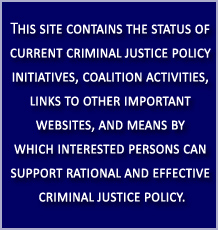
| Join our E-Mail Action Network |

How will the Stimulus Act Affect
Criminal Justice Reform in Massachusetts?
Feb. 17, 2010
Today the U.S. Senate voted to enact its version of the proposed Stimulus Bill, H.R. 1. A conference committee will meld the House and Senate versions for the President's signature. Among a number of items relating to criminal justice the following funding will be distributed among all of the states:
- $1.2 billion for Byrne Grants, distributed by the Bureau of Justice Assistance in the U.S. Department of Justice (the House version puts this figure at $1.5 billion);
- $300 million for competitive grants to improve the functioning of the criminal justice system, to assist victims of crime (other than compensation), and youth mentoring grants (the House version appropriated is $440 million for this item);
- $100 million to be distributed by the Office for Victims of Crime (the Houseversion has the same amount);
- $300 million for grants to combat violence against women: Provided, That, $50 million shall be transitional for housing assistance grants for victims of domestic violence (the House version is the same);
- $1 billion for the Community Oriented Policing Services (COPS) to fund additional police officers (the House version is the same).
To see the actual text of House and Senate versions the Stimulus Bill click on House (pages 43-46) and Senate (pages 43-46).
In FY 2008 and 2007 Massachusetts received roughly 2% or 1/50 of the total Byrne grant funds distributed. (See State Allocations) Assuming Massachusetts receives a comparable share of Byrne Grant funds from the Stimulus Bill, it would get somewhere between $24 and $30 million depending on whether the Senate or the House figure prevails in the bill that comes out of the conference committee. Byrne Grants can be used for a wide array of criminal justice programs including very traditional law enforcement activities and more innovative programs such as:
programs designed to provide additional public correctional resources and improve the corrections system, including treatment in prisons and jails, intensive supervision programs, and long-range corrections and sentencing strategies; programs which identify and meet the treatment needs of adult and juvenile drug-dependent and alcohol-dependent offenders; innovative programs that demonstrate new and different approaches to enforcement, prosecution and adjudication of drug offenses and other serious crimes; providing alternatives to prevent detention, jail and prison for persons who pose no danger to the community. (See Byrne Grant Measures paragraphs 11, 13, 16 and 20.) All Byrne Grants are funneled through state government, and for competitive Byrne Grants, through state and local law enforcement agencies, which can then partner with non-profit groups to provide services.
CJPC believes that the Patrick administration and law enforcement agencies should be encouraged to use whatever new Byrne Grant money that comes into the state to fund programs emphasizing diversion of non-violent offenders, treatment of drug offenders and support for re-entry of persons coming out of prison. To achieve real crime reduction diversion, treatment and support for re-entry are the most effective ways to use this money. CJPC urges you to write directly to Governor Patrick, or your county sheriff to encourage them to use the Byrne Grant funds for diversion, treatment and re-entry support.
For contact information for the Governor Patrick click here, for your county sheriff click here.
Joel Pentlarge
Interim Executive Director
Telephone (617) 390-5397
101 Tremont Street, Suite 509 | Boston, MA 02108 | Tel: 617-426-5222 | [email protected]